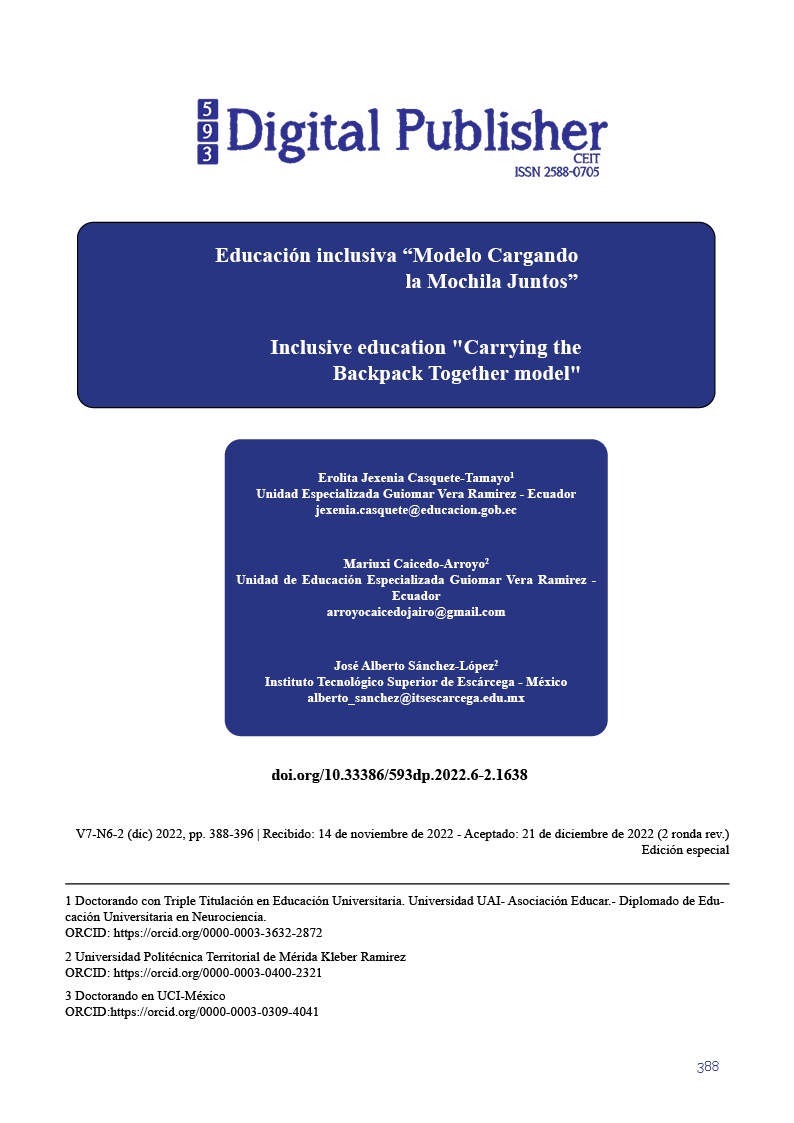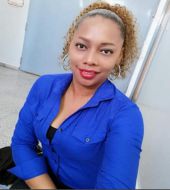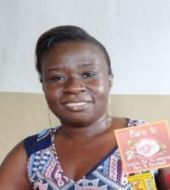Inclusive education "Carrying the Backpack Together model"
Main Article Content
Abstract
Educational inclusion in Ecuador has been presenting serious advances that have a full impact on the construction of a democratic and egalitarian society. In this sense, this project sought to broaden the horizons of inclusion by promoting interaction between common and special educational institutions. The objective of the project was that students of both modalities share enriching formative moments and that it also results in learning, all from the perspective of inclusion. The results showed that the students felt very comfortable sharing pleasant moments, feeling included and contained. Knowing what the mechanism of special schools is like was also another purpose pursued by the proposal. The results reflected that both modalities felt contained and obtained a lot of knowledge about each other and a pleasant interaction was achieved, contributing to the strengthening of educational inclusion.Key words: article template, author’s instructions, publish, state of the art.
Downloads
Article Details

This work is licensed under a Creative Commons Attribution-NonCommercial-ShareAlike 4.0 International License.
1. Derechos de autor
Las obras que se publican en 593 Digital Publisher CEIT están sujetas a los siguientes términos:
1.1. 593 Digital Publisher CEIT, conserva los derechos patrimoniales (copyright) de las obras publicadas, favorece y permite la reutilización de las mismas bajo la licencia Licencia Creative Commons 4.0 de Reconocimiento-NoComercial-CompartirIgual 4.0, por lo cual se pueden copiar, usar, difundir, transmitir y exponer públicamente, siempre que:
1.1.a. Se cite la autoría y fuente original de su publicación (revista, editorial, URL).
1.1.b. No se usen para fines comerciales u onerosos.
1.1.c. Se mencione la existencia y especificaciones de esta licencia de uso.
References
Arteaga Mora, Benito Alberto, & Andocilla Cabrera, Jaime Roddy. (2019). Impact of public policies of educational inclusion for students with disabilities in the Milagro Canton, 2007-2017 period. Revista Universidad y Sociedad, 11(5), 521-533. Epub 02 de diciembre de 2019. Recuperado en 25 de junio de 2022, de http://scielo.sld.cu/scielo.php?script=sci_arttext&pid=S2218-36202019000500521&lng=es&tlng=en.
Clavijo Castillo, Ruth Germania, & Bautista-Cerro, María José. (2020). La educación inclusiva. Análisis y reflexiones en la educación superior ecuatoriana. ALTERIDAD. Revista de Educación, 15(1), 113-124. https://doi.org/10.17163/alt.v15n1.2020.09
García, E. G. (2009). Evolución de la Educación Especial: del modelo del déficit al modelo de la Escuela Inclusiva. In El largo camino hacia una educación inclusiva: la educación especial y social del siglo XIX a nuestros días: XV Coloquio de Historia de la Educación, Pamplona-Iruñea, 29, 30 de junio y 1 de julio de 2009 (pp. 429-440). Universidad Pública de Navarra.
Moreno Rodríguez, R., López – Bastías, J. L., y Carnicero Pérez, J. D. (2020). Formación en atención a Necesidades Educativas Especiales: modificación de la percepción de los maestros de Ecuador sobre la inclusión de estudiantes con discapacidad en el aula ordinaria. Revista de Educación Inclusiva, 13(2), 139-152.
Rojas-Avilés, H., Sandoval-Guerrero , L., & Borja-Ramos, O. (2021). Percepciones a una educación inclusiva en el Ecuador . Cátedra, 3(1), 75–93. https://doi.org/10.29166/catedra.v3i1.1903 (Original work published 22 de enero de 2020)
Sánchez López, J. A. (2021). Planificación estratégica, algunas reflexiones teóricas. Folletos Gerenciales, 25(1), 62-72.
UNICEF (2014) Financiación de la educación inclusiva https://www.unicef.org/lac/media/35186/file/Financiacion.pdf
Vicepresidencia de la República del Ecuador (2011) Ministerio de Educación módulo I Educación Inclusiva y Especial https://educacion.gob.ec/wp-content/uploads/downloads/2013/07/Modulo_Trabajo_EI.pdf




